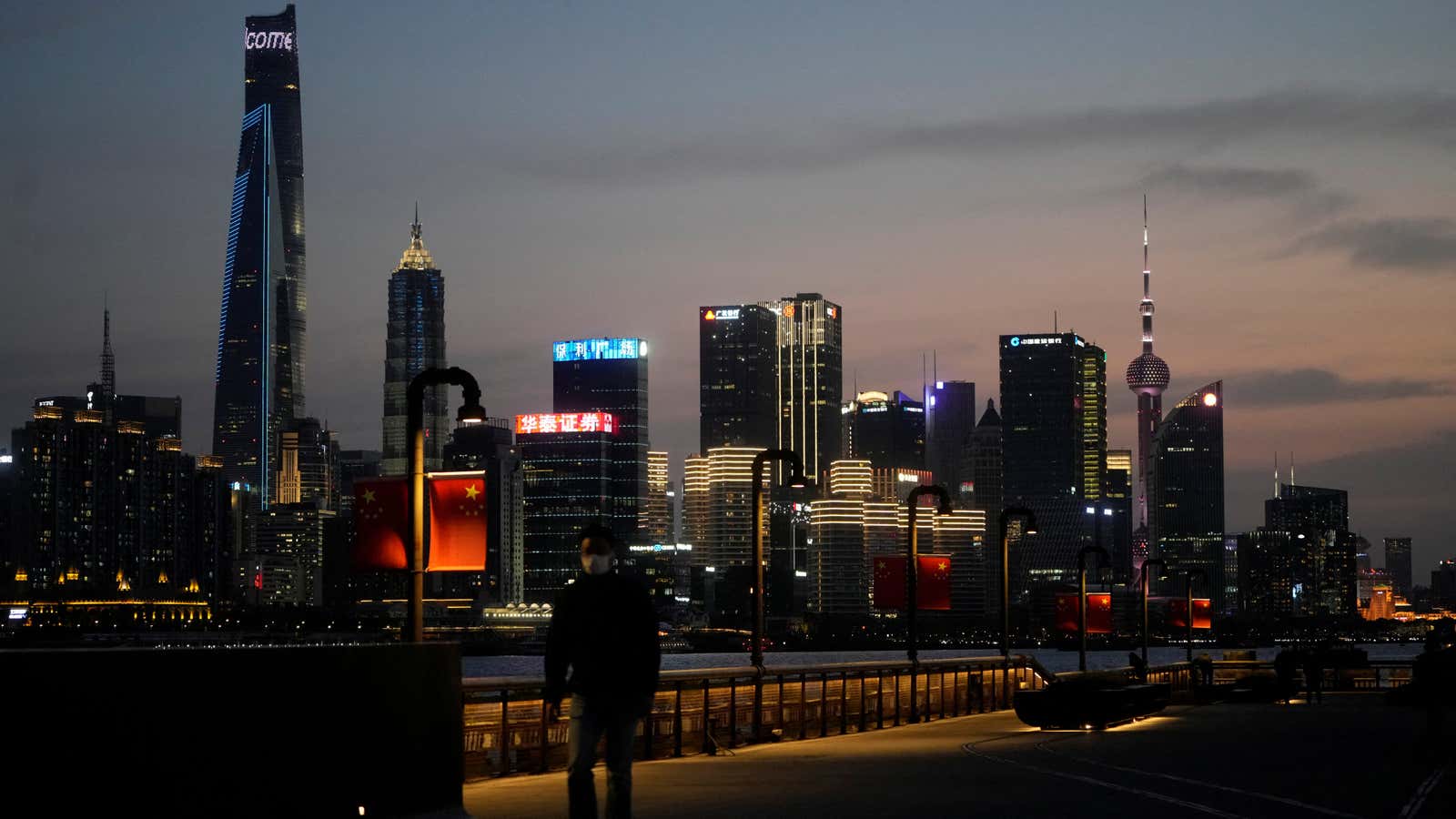China is finding ways to keep its economy moving along, even under its stringent covid zero policy.
In financial capital Shanghai, which began a two-stage lockdown on Monday (March 28), authorities are allowing companies (notice in Chinese) to keep going by adopting covid protocols that mimic the bubble designed for the Beijing Winter Olympics held in February, when the government created a “closed loop” around the hotels and venues used for the games, and prohibited participants from going outside designated areas till the event ended.
For workplaces, that means developing a system that isolates workers from the outside world by requiring them to temporarily live at their factories or offices, and have their mandatory covid tests done there, according to media reports. Earlier this month, manufacturers in the southern Chinese tech hub Shenzhen put in place similar arrangements with the approval of authorities, which may have helped reduce the economic toll of that lockdown.
How China’s factories adapted to repeated lockdowns
As the world’s factory, many operations in China can’t shift to work from home. As a result, factories in China seem to have become more skilled in coping with covid and the government’s stringent pandemic-control measures, according to a note last week from analysts at BofA Securities. When encountering sudden covid disruptions, they have used ways to cushion the impact on production including paying overtime to play catch-up, diverting production to factories in unaffected areas, as well as using closed-loop management within factory compounds, wrote the analysts.
Companies such as Chinese chipmaker SMIC are maintaining operations by allowing workers with negative covid test results who live nearby to continue working amid Shanghai’s lockdown this week, according to Bloomberg.
Meanwhile, as an important hub for biotech companies in China, Shanghai has also seen firms including GE Healthcare, which is under General Electric, set up temporary beds to let workers live in their factories in the city to continue small-scale operations for producing medical equipment and other goods for combating the virus, according to Chinese finance media Yicai. Hundreds of employees of German drug maker Boehringer-Ingelheim have also started living in the company’s Shanghai plants since mid-March to ensure production of antitumor drugs, said the outlet.
In addition, thousands of employees at some Shanghai dairy companies, as well as a car headlights maker have “treated the company as their home” even before this week’s lockdown came in, staying at the firms to ensure their operation, according to Chinese media.
The implementation of such measures are in line with Chinese leaders’ vow recently to minimize the economic impact of covid control measures, which have taken a toll on the country’s small businesses and citizens, who vented their frustration through memes and jokes online.
Camp cots, sleeping bags at investment firms
Shanghai is home to the country’s largest stock exchange and this period is a busy one for fourth-quarter and full-year results. The market has been turbulent in recent weeks, prompting many bankers and traders to also stay at their offices so they can continue to place orders.
Zhong Ou Asset Management, which has $98 billion in assets under management, said on its official WeChat account that dozens of employees “sacrificed their own homes for the bigger family,” volunteering to live at the firm since mid-March, when the city tightened restrictions to combat the virus. In a photo the firm uploaded, a camp cot was placed next to an employee typing on a computer at his desk, while in another picture, two camp cots were shown in what the company called the “rest area.”
In recent years, both white-collar and blue-collar Chinese workers have protested over work hours. But these arrangements appear to come with generous overtime pay, at least for professionals such as investment managers, who are being offered $300 for weekday overnight stays, according to Bloomberg. The preparations that companies are undertaking now, with airbeds, sleeping bags, and cooked food for workers, are preferable to the situation some workers have faced, when they’ve been locked down at their office buildings at a moment’s notice.
A smaller fund, Xinyuan Asset Management, on Monday also shared photos of temporary beds at its offices, saying the “trading room has turned into a girls’ dorm,” as four female employees, including a fund manager, have been sleeping at the company amid the city’s lockdowns. Even up until 10pm one day, many employees were still working in the offices, it said in a WeChat post. And as Shanghai’s covid restrictions become harsher, more staffers are flocking to the company to sleep over as some worry their residential compounds could be under lockdown soon, it added.
“We know deeply that the shadow of covid is yet to dissipate, but financial services can’t stop even for a moment,” said the firm.
